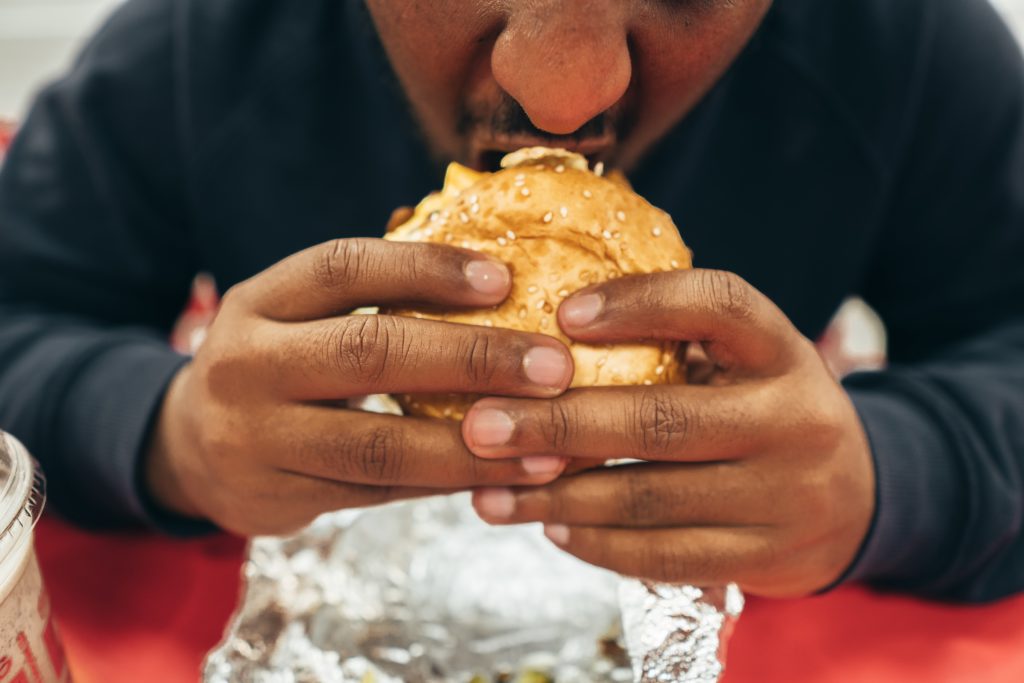Keywords: weight loss, healthy eating, nutrition
Have you ever thought to yourself, “Why am I not losing weight? I’m putting in the effort but not seeing the results I want.”

I get it!
Weight loss is not easy. It is a process that requires time and commitment. I wish I were here to give you a quick solution, but the truth is… there is none. If a person is losing weight rapidly, it is generally a sign of unhealthy eating behaviors.
The good news is that weight loss is 100% achievable! Losing weight steadily, around one to two pounds per week, is more likely to lead to long term success (Center for Disease Control and Prevention [CDC], 2020). However, if you can relate to putting in solid effort but not quite shedding the lbs, here are some factors to consider that may be hindering your progress:
1. YOU’RE EATING TOO MUCH.

Photo by Marcel Heil/Unsplash
One of the most important factors in weight loss is calories in vs. calories out. You want to burn more calories than you consume. However, it is important to keep in mind that not all calories are created equal.
For instance, a 100-calorie candy bar may fit into your allotted calories for the day but deliver no nutritional value, contain additives like sugars and oils, and leave you feeling hungry again in an hour. Whereas a 100-calorie banana contains essential vitamins, minerals, water, and fiber that will keep you feeling fuller longer.
Feeling full and satisfied can help in reducing your total daily calories. A study conducted on obese lab rats found that fiber was more effective than protein for increasing satiety and decreasing overall caloric intake, thus, leading to weight loss (Adam et al., 2016). Check out this awesome list of foods to keep you feeling fuller longer.
Tips:
- Eat more whole foods like fruits, vegetables, whole grains, legumes, and nuts/seeds.
- Periodically track your food to get an idea of what you’re really consuming. MyFitnessPal is a great tool!
- Exercise regularly to burn more calories.
2. YOU’RE FORGETTING ABOUT OILS AND CONDIMENTS.

Photo by Roberta Sorge/Unsplash
Foods like salad dressings and sauces often contain loads of additives, like added sugar, which packs on extra empty calories. When using oils, its best to go with ones that contain boosting health benefits like extra virgin olive oil with its monosaturated fats and polyphenols. But remember, oil is a fat which means it has a high-calorie content.
Since a huge indicator of weight loss is calorie intake, you may want to ask yourself how much of these foods you’re actually consuming. It may be helpful to measure the oil you use for cooking or dressing your salad. Remember, one tablespoon of oil typically contains 120 calories!
P.s. if you are already tracking your food and still not seeing results, you may be forgetting about these sneaky foods.
Tips:
- Try to be mindful of what you are adding to your foods & how you are cooking them.
- Try flavoring your foods with herbs and spices first over oils and sauces.
- Try out some new homemade salad dressing and sauce recipes to skip out on all the unnecessary additives.
- Try sautéing or baking vegetables using minimal EVOO and be sure to measure it out! (Hint: veggies can also be prepared without oil… lemon juice also makes them super yummy.)
3. YOU’RE NOT SLEEPING ENOUGH.

Photo by Vladislav Muslakov/Unsplash
Research shows that lack of sleep is directly linked to weight gain and people who sleep too little tend to weigh more than those who get enough sleep (Harvard School of Public Health [HSPH], n.d.). This can be for a number of reasons. Being tired may cause you to skip out on exercise, causing you to burn fewer calories. Being awake longer gives you more time to eat, creating the likelihood of higher calorie intake.
Additionally, research shows that sleep deprivation disrupts hormones that regulate appetite, like cortisol, leading people who are tired to feel hungrier (HSPH, n.d.).
Tips:
- Try implementing a sleep schedule, i.e. waking up and going to sleep at the same time every day.
- Switch out coffee for caffeine-free tea in the afternoon and at night.
- Eliminate screen time at least 30 minutes before bed.
4. YOU’RE STRESSED.

Photo by Christian Erfurt/Upsplash
Research shows that stress leads to weight gain in a number of ways. Like sleep deprivation, stress causes an imbalance in hormones, specifically elevated cortisol levels (Van der Valk et al., 2018). Cortisol can lead to sugar cravings and slow down metabolism. Stress can also lead to unhealthy behaviors such as emotional eating along with exercising and sleeping less (Van der Valk et al., 2018).
Tips:
- If you’re feeling stressed try: reading, going for a walk, journaling, calling a friend, or listening to music.
- Research shows comfort food is a myth! According to a study done by Wagner et al. (2014), comfort food does provide mood benefits, however, no more than other foods or no food. So, if you’re feeling stressed, reach for a healthy snack first before diving into a pizza!
5. YOU’RE TAKING WEEKENDS OFF.

Photo by Jakob Owens/Unsplash
Do you find yourself working hard all week and then binging on fast food, sweets, or alcohol on the weekends? The first step is to forgive yourself! We are all human and it is perfectly fine to enjoy yourself. The second step is to realize that consistently doing this can put you in a caloric surplus, which is why you may not be seeing the results you want.
Tips:
- Do not feel guilty!
- Get back to your normal healthy routine.
- Try being less restrictive. Research shows that depriving yourself of tasty foods can actually cause the body to react the same way it would under stress and anxiety, which can lead to binging episodes (National Institutes of Health, 2009).
Weight loss is a lifelong process with many factors that can influence it. Small steps and realistic goals are more likely to lead to long-term progress than short-term unhealthy diets.
Consumption of whole foods, like fruits and vegetables, combined with being in a caloric deficit will lead to weight loss. Adding flavor to foods with herbs and spices, rather than oils, will lower calorie content. Getting a good night’s sleep and learning healthy ways to cope with stress are also key factors in weight loss. Lastly, treating yourself is perfectly fine. Try not to fall into the mentality of giving up because of one day, weekend, or even week of binging.
The key to long-term weight loss is consistency. Giving up will never get you to your goals, getting back on track will!
References
Adam, C.L., Gratz, S.W., Peinado, D.I., Thomson, L.M., Garden, K.E., Williams, P.A., Richardson, A.J. & Ross, A.W. (2016). Effects of dietary fibre (pectin) and/or increased protein (casein or pea) on satiety, body weight, adiposity and caecal fermentation in high fat diet-induced obese rats. PLoS ONE, 11(5): e0155871. https://doi.org/10.1371/journal.pone.0155871
American Heart Association. (2015). Monosaturated fat. https://www.heart.org/en/healthy-living/healthy-eating/eat-smart/fats/monounsaturated-fats
Center for Disease Control and Prevention. (2020). Losing weight. https://www.cdc.gov/healthyweight/losing_weight/index.html
Center for Disease Control and Prevention. (2019). Coping with stress. https://www.cdc.gov/violenceprevention/suicide/copingwith-stresstips.html
Center for Disease Control and Prevention. (2015). Eat more, weigh less? https://www.cdc.gov/healthyweight/healthy_eating/energy_density.html
Harvard School of Public Health. (n.d.). Sleep deprivation and obesity. https://www.hsph.harvard.edu/nutritionsource/sleep/
National Institutes of Health. (2009). Restricting sugary food may lead to overeating. https://www.nih.gov/news-events/nih-research-matters/restricting-sugary-food-may-lead-overeating#:~:text=But%20depriving%20yourself%20of%20tasty,when%20you%20get%20a%20chance.
Straight Health. (2017). Calorie surplus. https://straighthealth.com/what-is-a-calorie-surplus/
Van der Valk, E.S., Savas, M., & Van Rossum, E. (2018). Stress and obesity: Are there more susceptible individuals? Current Obesity Reports, 7(2), 193–203. https://doi.org/10.1007/s13679-018-0306-y
Wagner, H.S., Ahlstrom, B., Redden, J.P., Vickers, Z., & Mann, T. (2014). The myth of comfort food. Health Psychology: Official Journal of the Division of Health Psychology, American Psychological Association, 33(12), 1552–1557. https://doi.org/10.1037/hea0000068